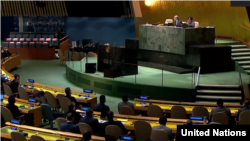Analysts say an ''exceptional attention'' is needed by leaders attending the 77th session of the United Nations General Assembly in New York to address global food insecurity, exorbitant energy bills for countries particularly hard hit by record inflation.
Energy bills hit its highest in decades as Europe stopped buying Russian gas, and the United States ramped up sanctions against the Kremlin. These measures led to skyrocketing prices of some basic commodities in most parts of the world, even as the world was trying to recover from the Covid-19 pandemic.
Noaman Khalid, Associate Director at global investment firm, Arqaam capital told VOA from Cairo that it's imperative for the leaders to chart a different path in addressing these enormous hurdles facing many nations of the world.
''At the beginning of this year, not everyone expected the sort of volatility the war in Ukraine has brought on the world, and so exceptional measures are needed at this time," he said.
''Egypt for instance has managed to keep the import of foods like wheat and other major commodities through diplomatic ties with various countries whether in Europe or Asia," he said, adding "This is not the case for some African countries, and so they'd continue to experience these shortages.''
Harry Burns, Vice President at London-based communications consultancy firm, Crestview strategy UK, told VOA that the conflict in Ukraine has had a ''knock-on effect," thus leading to a ''lack of progress in dealing with the climate emergency," which has devastating long term effects globally.
He said leaders at the UNGA meeting must prioritize the climate emergency and make a case for donors to deliver on pledges made towards the continent's efforts at tackling the crisis.
''Africa accounts for about 3% of the world's CO2 emissions each year, but we all know that Africa is suffering the most from the climate change - the flooding, droughts and everything else that comes with it," Burns stated.
"And so, Africa has been crying out for a long time for the global north to deliver on their promises, and provide the climate financing which is so desperately needed," he said.
According to Climate Policy Initiative, it would cost some $2.8 trillion between 2020 and 2030 for Africa to implement its nationally determined contributions (NDCs). NDCs comprise efforts by each country to reduce national emissions and adapt to the impacts of climate change. African states have pledged $264 billion of domestic public resources, just 10% of total cost. Meaning, the remainder of $2.5 trillion must come from international sources and local private sector industry.
On national debts consuming most developing countries, analyst Khalid urged leaders to consider at the very least postponing payments or writing off such loans.
''Cancellation (of sovereign debts) definitely comes as the last resort, but rescheduling repayments is worth considering because at the end of the day, we're currently experiencing a tough global environment from a monetary point of view as we're seeing a strong monetary tightening," Khalid commented, adding "And this restricts the ability of governments to borrow from abroad - whether from commercial banks or other multilateral funds.''
He concluded that ''You want to actually limit the burden of external payments by rescheduling those types of loans over a couple of years.''




